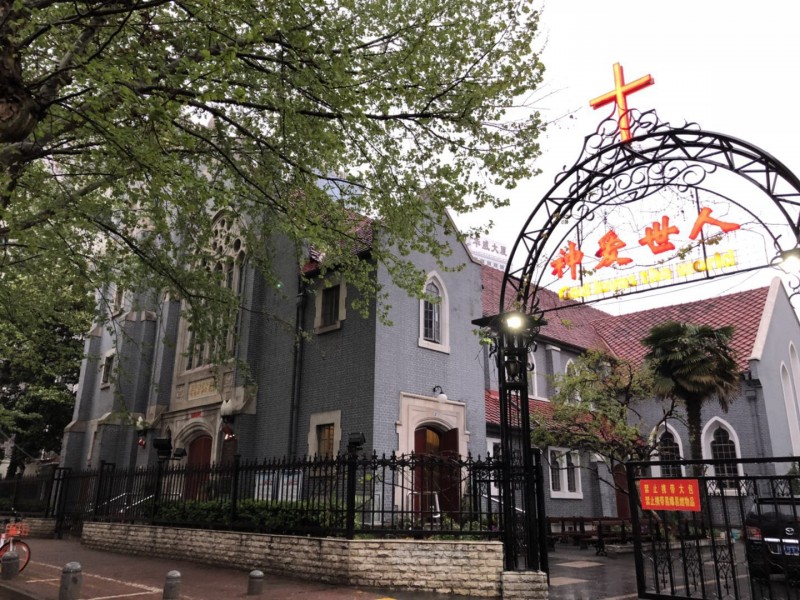Li Lancheng, the pastor of Nanjing Mochou Lu Church, urged believers to worship the Lord in spirit and in truth depiste they have to stay at home. In a sermon delivered last Sunday, entitled "Experience the Omnipresence of the Lord", Christians should allow the presence of the Lord to be there no matter if it is voiced prayer or silent meditating, praying or worshipping.
He also asked the congregation to pray for an early end to the pandemic and an early resumption of public church services since all the onsite services in China have been suspended in late January.
He said last Sunday marks the first Sunday of Lent this yearn and gave Bible verses to study to the flock to read, meditate on, and pray around at home.
He mainly touched on three points: to acknowledge the omnipresence of the Lord; to experience the Lord accompanying you at home or away; and to look up to the Lord's mercy and presence.
Acknowledging the omnipresence of the Lord
According to Exodus 3:14-15, God revealed His name as 'I AM WHO I AM', meaning 'the eternal God'. Before there were humans, the stars and all things in heaven and earth, God was there. After the world is no longe and everything has melted away, God is still there. This is what His being "eternal" means.
In fact, the name of God ("Jehovah") in the original Hebrew language is composed of four silent sacred consonant letters and pronounced "Yahweh" when put together. "Yahweh" means I AM WHO I AM. All of us "beings" have short lives and change., For example, a person starts as a baby/child, then becomes a student/youth, then a husband/father, then a grandfather, and finally nothing, because the person is no more. A person's "being" will change and not last long. Yet, God's "being" is always "existing" and he does not change. Such a God is truly upon whom human beings can depend and look to.
David experienced God's omnipresence in Psalms 139:1-12. God knows all about people's thoughts, actions, and words. Therefore, he prayed to God to supervise him and to test him, to guide him to walk on the correct and hopefully the "path to eternal life" (Psalm 139:23-24).
Experiencing the Lord's accompaniment while home or away
The Lord is also the omnipresent Lord and He is with those who are close at home as well as with those who are away or travelling alone. First, look at the experience of Jacob (Genesis 27:41-28:22) who traveled away from home.
God appeared even in Jacob's dreams and promised to be with him. Originally, he thought that the God of his parents was only present with him while he was at his home. But when he left home to go out to the wilderness, this God was there with him! From then on, Jacob, out of faith, walked on the path of being blessed. In spite of Jacob's long and lonely journey which included later going to his uncle for shelter and experiencing so many difficult ups and downs, he always firmly grasped the promise of God. That was why God loved him, trained him, and treated him with kindness.
Jacob could be nurtured by the Lord because he feared the Lord. Although he had shortcomings, the Lord refined and trained him so that he grew. Finally the God of Abraham and Isaac also became the God of Jacob (Exodus 3:6).
In addition, one of the sons of Jacob named Joseph, because of his love for and obedience to the Lord, experienced the Lord's presence (Genesis 37-50) regardless of whether he was away or at home. In particular, he explained the meaning of his inmates' dreams while in prison, foretelling that the one inmates' former position would be resumed while the other inmate would be killed. And it, in fact, really happened that way. The man, who had promised to defend Joseph's case after his return to office, forgot about Joseph as soon as he was released from prison and forgot it for two years. Only two years later when Pharaoh had strange dreams no one could interpret did the man remember Joseph and recommended him to Pharaoh. Because Joseph solved the puzzling dreams for Pharaoh and offered good policy for governing the country, he was released from prison. Pharaoh immediately promoted him to be the prime minister when he was only 30 years old, being promoted to second in command under Pharaoh. He was in charge of the government of Egypt collecting the harvest during good years and feeding the people from that harvest during the bad years. He thus also rescued his father's household and the people of the time.
At last, Jacob's family of more than 70 people went down to Egypt, living there for many generations. Joseph repeatedly forgave those brothers who had treated him badly. Whether at home or away, whether in fortune or hardship, Joseph feared the Lord and kept God's way. In a variety of situations, he experienced the goodness of the Lord. Joseph is really a role model for us to follow.
Looking up to the Lord's mercy and presence
First of all, know that the Lord of the Trinity is willing to be with us.
God placed Adam and Eve, our created human ancestors, in the beautiful Garden of Eden, and asked them to take care of it. The orders given to mankind were to be obeyed. At that time, the Lord also often walked in the garden and had close contact with them. Although they fell and sinned, God called to them, seeking them in order to give them salvation so that mankind could enjoy the grace of God's presence.
God's wish to be with all men can also be understood through His choosing the Israelites to lead other peoples to know and return to God. From as early as the time when Adam's descendant Seth was chosen, to the descendants of Abraham, and later to Jacob (renamed Israel), the Israelites became the chosen people. God had shown His willingness to be with us. Through God's chosen people, we come to believe in the Lord and to learn to know and fear Him.
In the Old Testament times, God was with man through worshipping in the Holy Temple. After have been captured, exiled and finally returned to their homeland, there was no Temple for a period of time. The Israelites built synagogues where they lived to learn the Law and worship God. The Temple was later rebuilt after the Jews were allowed to return. They then worshipped the Lord both in the Temple and in the synagogues. By the time of the New Testament, Jesus and the Jews in general were still worshipping in both the Temple and the synagogues. The first church, too, met in the Temple, in the synagogue, and at home reading the Bible, praying, and worshipping.
During this special time, as long as we pray with sincerity and honestly worship with our hearts, regardless of when or where, we will be blessed by the Lord.
- Translated by Charlie Li











